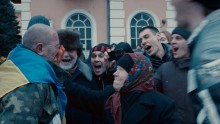Traditionally, the Cannes competitions include the main one, dealing with feature-length films, as well as Un Certain Regard, International Critics’ Week, and Camera d’Or (the latter awarded for the best debut). The main jury will be led by well-known Australian actress Cate Blanchett.
For the first time in many years, the main competition will not be opened by an English- or French-language film. Penelope Cruz and Javier Bardem star in the Spanish-language thriller Everybody Knows, directed by Iranian Asghar Farhadi. Farhadi gained fame with his 2011 drama A Separation, which won an Oscar, a Golden Globe, and a Golden Bear in Berlin. Cruz plays Laura, who lives with her husband and children in Buenos Aires. Later, the family returns to Laura’s hometown in Spain, and an unexpected event completely changes the lives of the characters. By the way, the opening film not using either main language of the festival was previously last seen in 2004, when the Cannes festival started with Pedro Almodovar’s drama Bad Education, also made in Spanish.
Another Iranian competitor, Jafar Panahi, with the film Three Faces, is unique not only because of his panoply of prizes (a Camera d’Or, a Golden Lion of Venicke, and a Golden Bear of Berlin), but also due to the fact that having lived for many years under house arrest coupled with a ban on the profession, the director has still managed to make three feature-length films. Russian Kirill Serebrennikov’s production Summer, depicting the Leningrad rock scene of the early 1980s, is also in the running, while the director himself is under house arrest. Meanwhile, even though the Chinese participant Jia Zhangke (Ash Is Purest White), fortunately, is not imprisoned in his homeland, he is still seen as an underground filmmaker, and most of his works are not cleared for public release.
Overall, the main competition is full of prominent names. Many cinema aficionados will be thrilled to learn that the founder of the New Wave, the eternal avant-garde artist and revolutionary, bourgeois and scandalist, 87-year-old Jean-Luc Godard takes part in the competition with The Image Book. His latest films were more like elegant cipherograms or streams of the author’s fantasies, so one should expect that The Image Book will be no less of an enchanting riddle for the audience and the jury.
This is not the end of the list of celebrity guests. Outside of the competition, the festival will host a screening of The House That Jack Built – a thriller by Lars von Trier, who is just as scandal-prone as Godard; in it, Matt Dillon plays a law-abiding citizen who develops into a virtuoso serial killer. The event will close with one of the longest-anticipated productions of European cinema – The Man Who Killed Don Quixote by the British storyteller Terry Gilliam.
Besides living classics, contenders for the Palme d’Or include twice-winner of the Cannes Grand Prix Matteo Garrone from Italy; his new work is called Dogman. The intrigue will be reinforced by the Polish cinematographer Pawel Pawlikowski, who won an Oscar in 2013 with the drama Ida; he will now present Cold War in Cannes. Another winner of the Grand Prix is 36-year-old Italian Alice Rohrwacher, who has brought Happy as Lazzaro to the event. Also, the arrival of Cannes favorite Paolo Sorrentino with his Loro, a four-hour-long biopic about Silvio Berlusconi, cannot be ruled out yet.
Two independent directors from different generations will come from the US – 61-year-old African American classic Spike Lee and 44-year-old David Robert Mitchell, who caused a sensation in 2014 with his low-budget horror film It Follows. Less prominent competitors include French writer and director Christophe Honore and his fellow countryman Stephane Brize, Lebanese Nadine Labaki, Korean Lee Chang-dong, and Japanese Hirokazu Koreeda, who also appear regularly on the seafront promenade of La Croisette.
Ukraine, given the permanent crisis situation in our film industry, will be represented quite solidly, with entries in two sections at once.
The premiere of the thriller Woman at War (France-Iceland-Ukraine) will be held within the framework of the International Critics’ Week. In 2014, The Tribe by Myroslav Slaboshpytskyi sensationally won three prizes in that section along with the Grand Prix.
Woman at War is the second work of Icelandic director Benedikt Erlingsson. The film tells the story of a choir conductor named Halla. Halla is 50, and she leads the secret life of a radical environmental activist. When the heroine plans her most daring operation to date, she receives an unexpected letter: her application for adoption of a child is finally approved and a little girl from Ukraine is waiting for her. Halla is preparing to quit as an eco-saboteur, but in order to fulfill her dream of becoming a mother, she resolves to launch another, final attack to strike the aluminum industry a devastating blow. The principal photography lasted for eight weeks at various locations in Iceland and Ukraine.
The drama Donbass, filmed by Ukrainian director Serhii Loznytsia, will open the program of Un Certain Regard, also on May 9. A Ukrainian film has entered this competition for the first time, and it also marks the first time that a Ukrainian movie will open one of the Cannes programs.
The film was created as co-production involving Germany, Ukraine, the Netherlands, France, and Romania. It is worth recalling that Loznytsia’s film My Joy (Ukraine-Germany-the Netherlands) participated in the main competition in 2010, while his A Gentle Creature (France-Ukraine-Germany-Lithuania-Latvia-the Netherlands-Russia) did the same last year. This year, the actor Benicio del Toro has been selected as chairman of the Un Certain Regard jury.
It goes without saying that we are pinning special hopes on this premiere: for the first time ever, an attempt to comprehend our war through a feature film, made by a director of Loznytsia’s caliber, will be presented at a major international forum.
The winners of the Cannes awards will be announced on May 19.








